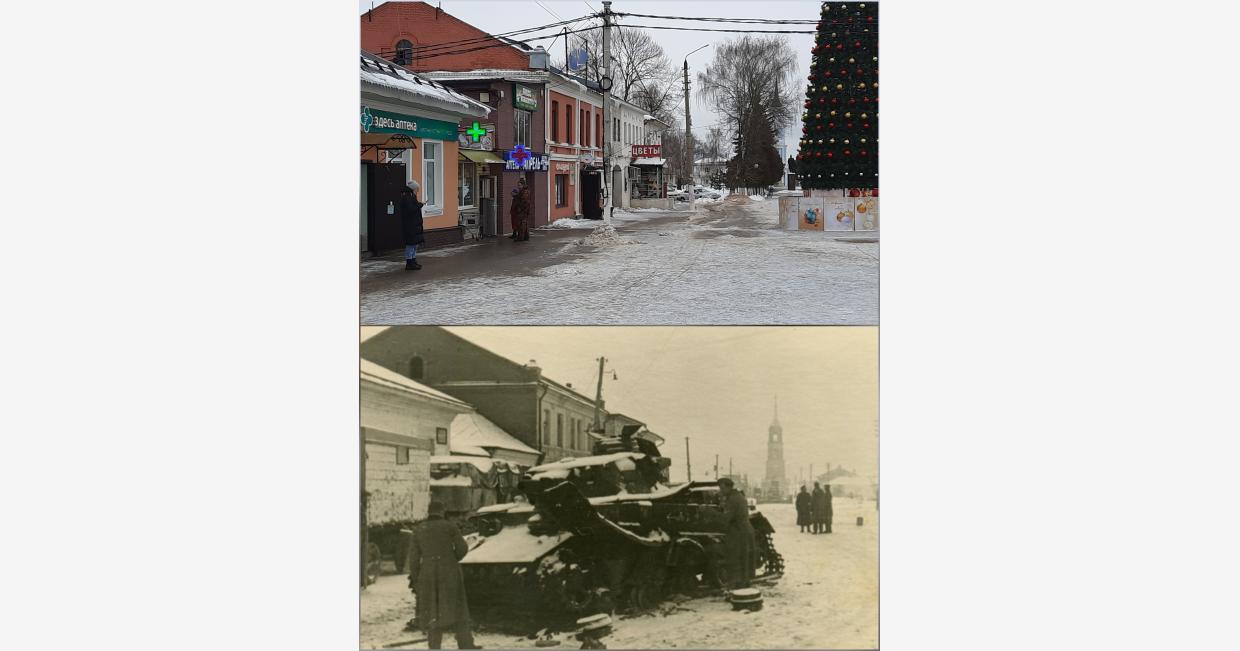Venev, Leo Tolstoy street. December 1941. / Venev, Leo Tolstoy street. December 2021
German soldiers examine a destroyed PzKpfw IV Ausf.F1 from the 17th Panzer Division. The bell tower of the St. Nicholas church can be seen in the background.
The next day after capturing the town the Germans announced the election of the city head at a townwide election. Less than a hundred out of the 7000-strong population of Venev came to "make their democratic choice". At the end of the meeting, where a German officer urged the locals to turn in Jews and Communists to the occupation authorities, the town hall accountant Zuyev was elected the Burgermeister and the German teacher Saltykov was appointed as his deputy. Beside them a number of traitors immediately reported on local collective farm chairmen, school directors and those who worked in Soviet government offices.
At the end of the fighting in the city which lasted for 12 hours a group of Red Army soldiers took refuge in the basement of the house owned by Vasily Peshekhonov, who worked as a guard at the Venev town council. The 58 year old Vasily had a quite negative experience under the Soviet rule coming from a rich farmer's family. In 1929 he was declared a kulak, stripped of his voting rights and food coupons and sent in exile from the town for 5 years. When the town was occupied he likely decided that the Soviet power in the country was about to collapse and the Germans came there to stay for good, and turned in these soldiers. On top of that he reported on two local residents, Buzovkin and Kostyakov, as Soviet sympathizers. Some of the soldiers he betrayed were shot on the spot, while others were led into captivity where many died of starvation and exposure. After the liberation of the town Buzovkin and Kostyakov, who managed to survive their imprisonment, testified against Peshekhonov at a trial which lasted for 2 months and ended with the death sentence to the traitor. The Burgermeister and his deputy were shot the next day after the liberation of the town.
Many local residents were expelled from their houses to make room for the German garrison. Those who weren't able to find themselves any new shelter in a war-ravaged town stayed in the basements, feeding on frozen potatoes. All kerosene lamps were confiscated while all remaining wooden fences and trees were used up for firewood. In the village of Bolshiye Zalomy a woman with two children was thrown out of her house because the children's cries disturbed the German soldiers' sleep. Hundreds of people were stripped of their warm clothes for the needs of the occupying army. All women were forced to do the dirty laundry of German soldiers while old people had to carry them water. Any violation of the curfew or even peaceful expression of discontent was punishable by death. In total several tens of people were executed in Venev and its surroundings during the 2 weeks of the occupation.
Articles from local history websites veneva.ru, stalinogorsk.ru and "Tulskiye Izvestia" were used in writing this and other posts on Venev and the battle of Moscow.
